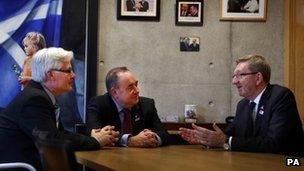First minister's questions
- Published
A curious contest at first minister's questions today, operating on both a primary and secondary level.
It was a little like watching a play where the main action is salient, if a little predictable. Your eye ineluctably drifts to the scene-stealing cameo at the rear, stage left.
On this occasion, the main protagonists were upstaging themselves. The script concerned energy prices. But they could not resist ad libs about the remarkable and continuing controversy of Grangemouth.
It started in truth with another political event from the parliamentary recess, the Dunfermline by-election.
In full satirical flow - on show repeatedly today - Alex Salmond welcomed Labour's support for universal service provision, as witness their leaflet at the close of that Fife contest.
It was, he suggested, in contradistinction to a speech made by Labour's Johann Lamont a year ago in which she had announced a commission to investigate policy priorities.
He had tried, he said, to retrieve that speech from the Labour website only to be advised, in online speak, that "oops!", the page could no longer be found.
Ms Lamont suggested, in reply, that Mr Salmond had apparently learned nothing from his two weeks off during the recess in that he remained unable to answer straight questions.
This was too much for the increasingly svelte FM. He had not spent the recess in indolence, strumming a small guitar.
Rather, he had devoted most of the time - in company with others - to the battle to save the Grangemouth petrochemical plant.
He was, he added, "not quite certain" what role Ms Lamont had played.
There. It was out. Said. Grangemouth. An industrial dispute linked to the internal workings of the Labour Party through the union Unite (whose members include Lamont, J.)
Lamont taunts
How would she respond? With determination. Her "only focus" had been the rights of the workers. And with anger. The first minister's comments were "unworthy" of the seriousness of the situation.
It seemed just a little harsh, given that she had accused the FM of slacking and putting Scotland on pause to pursue his independence "obsession".
But the tone undoubtedly reflected the sensitivity of this topic.
The scene-stealing cameo grew more intense. Mr Salmond replied that he was merely responding to Ms Lamont's taunts.
He said that his actions - again, with others - had been successful. Note that consistent reference to others. The plant was saved by concerted action, involving UK ministers - and Mr Salmond seemed determined to maintain that position.

Mr Salmond made efforts to help resolve the Grangemouth dispute
To be fair, the energy drama was intriguing too. Ms Lamont defended Ed Miliband's plan for a freeze on energy prices, should Labour win power.
She contrasted this with the SNP proposal to take fuel poverty charges off bills into general taxation, thus cutting the cost for consumers.
Labour, she said, were standing up to the "Big Six" energy companies. The SNP were helping them out. Mr Salmond noted in response that he did not, presently, have power over power.
It was, he argued, a disgrace that energy rich Scotland endured fuel poverty.
Enter stage right Ruth Davidson of the Tories. Would she too go for that intriguing cameo? Would she pursue the issue of Unite tactics in Grangemouth - now condemned by her party chairman Grant Shapps as "thuggish"? (Unite has dismissed the attack.)
She did not, choosing instead to quiz the FM once more on the subject of police counter closures. Behind her, the cameo faded out of sight.